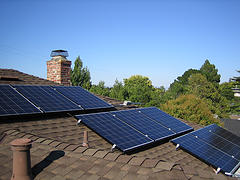Introduction to “Distributed Solar Generation for Duke University”
By Jennifer Sekar
The Bass Connections project “Distributed Solar Generation for Duke University Employees” aims to remove some of the barriers that prevent people from installing rooftop solar on their homes. Our team is working with faculty and staff from the Duke Carbon Offsets Initiative (DCOI), the Nicholas Institute for Environmental Policy Solutions, the Sanford School of Public Policy, and the Duke Environmental Law Clinic.
This semester’s main goals were to thoroughly review the literature and policy relevant to this program and organize it into a scoping document. In addition, we also completed interviews and attended events with key players in the solar market in North Carolina. This blog post provides background information on the project and is followed by blog posts that document our work and key findings.

Duke University has pledged to be climate neutral by 2024. This means reducing our greenhouse gas emissions as much as possible and then offsetting the rest. One way of reducing our emissions is by purchasing and/or generating Renewable Energy Certificates (RECs). RECs represent all of the non-power qualities associated with renewable energy generation, such as the environmental qualities. All renewable energy generation produces two things: the actual electricity and the RECs. We can purchase these RECs and use them to reduce our carbon emissions. For more details on RECs see the Environmental Protection Agency’s description here. For this project we are designing a pilot to test how Duke can help generate and purchase RECs locally through a distributed solar program.
To make this project viable, we need to remove barriers such as high upfront cost for solar energy systems and lack of information on distributed solar and solar installation. To do this, we plan to work closely with solar installers so that we can reduce costs. We will also be compiling our information in fact sheets and FAQs to be distributed to potential consumers so that the relevant information is easy to access and easy to digest.
Three different programs will be used as references for this one: DCOI-HEAL, Solarize, and the Solar Community Initiative. DCOI-HEAL is a pilot program, run by DCOI, that enables Duke University employees to perform energy efficiency upgrades within their homes. Solarize is a program that provides communities with the information and tools to make solar panels more affordable and the Solar Community Initiative is a program that uses bulk purchasing to generate large discounts for companies. All three programs focus on removing the barriers to entry of their respective markets, which is the purpose of our program.
Some key questions we are asking:
- What barriers currently exist for consumers in this market and how can we best remove or reduce them?
- Under what circumstances will this program be beneficial if implemented?
- How can price trends of the hard costs and soft costs of solar-PV systems help us determine the future of the market,
as well as where costs can be cut in this program? - How will the implementation of this program affect the goal of carbon neutrality?
- What tools can be used for a potential consumer to assess whether solar-PV systems are good investments?
Although the goal is for us to be able to implement a pilot program while we are all still involved with this project, we want to be able to provide others with the materials and information necessary to replicate and scale the project. We hope that this project can help make renewable energy more accessible for people here at Duke University and other schools around the country.